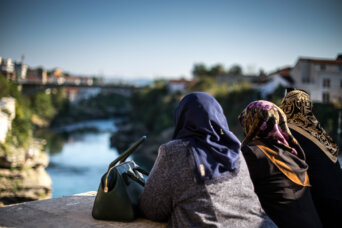- About
- Topics
- Picks
- Audio
- Story
- In-Depth
- Opinion
- News
- Donate
- Signup for our newsletterOur Editors' Best Picks.Send
Read, Debate: Engage.
| topic: | Women's rights |
|---|---|
| located: | Bosnia and Herzegovina |
| editor: | Katarina Panić |
In fighting against both domestic and gender-based violence in the Balkans, victims very often give up testifying against perpetrators.
"When this happens - and it repeats in the vast majority of the cases - the system is almost powerless," Mladen Mitrović, the County Prosecutor in Bosnia and Herzegovina, told FairPlanet.
The Istanbul Convention is widely implemented in domestic abuse legislation, and it provides a high level of victims' protection. At the same time, criminal procedure codes expanded the group of privileged witnesses (who may refuse to testify). Previously, only relatives in a straight line were in this category; now, the relatives along the lateral line and even in-laws are in this scope too.
The police, judiciary, social care centres, health facilities and NGOs have been working for decades to encourage the victims to speak up about the violence. According to the increasing numbers of cases reported, they were quite successful.
Now, the authorities face another challenge: keeping the victims by their side. Only with the full cooperation of the victims, the system may protect them. Otherwise, victims are acting in favour of the ones who torture them.
"Usually, they report the violence when it is most intensive and when they are most afraid. Afterwards, they retreat. And we lose one of the most important [pieces of] evidence. We even are not allowed to use their previous statement in court. In my office, we have an example [where] the same victim did exactly this four times against the same perpetrator," Mitrović said.
On the other hand, there were examples of final conviction regardless of the victim giving up.
"The woman was beaten so heavily that the medical records were such strong evidence that we didn't need her testimony to prove he is guilty. This is rather an extremely rare situation. Unfortunately, many of the victims refuse even the medical exam either and then our hands are tied," Mitrović added.
Speaking off the record, all institutions of protection complain that they are a bit tired of feeling they do sisyphic jobs. Once the violence is reported, they engage all their resources and time-consuming procedures, and in the end, the victims give up. However, they won't admit that this may decrease their sensitivity for preventing and combating violence.
Image: Sebastián Villar.

